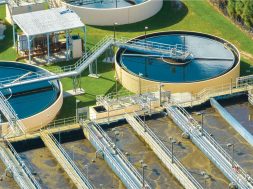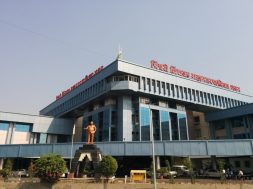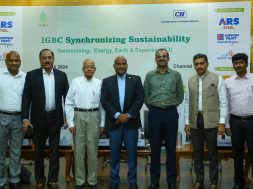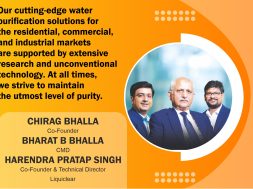The progress of wastewater to wealth

Innovative technologies like real-time sensors and bio-refineries are reshaping India’s water management landscape, driving efficiency and sustainability.
The industry is witnessing a standard shift towards energy-efficient and environmentally conscious practices. Amidst challenges posed by costs, regulations, and global disruptions, industry leaders such as Voltas, Danfoss, and Organica Biotech are forging ahead with comprehensive solutions, epitomising a commitment to a future where water is treated, recycled, and revered.
India’s water and wastewater management market has reached a value of nearly INR 216.03 billion. It will soon escalate to INR 518.15 billion by 2027, with a compound annual growth rate (CAGR) of 15.95 percent between 2023 and 2027. This expansion is attributed to increased private investments and governmental initiatives introducing new business models. Water and wastewater treatment processes consume 25 -40 percent of municipal electricity. Companies like Danfoss, AC drives and real-time online sensors have emerged as silent heroes in this endeavour. By employing these technologies, municipalities have witnessed remarkable reductions in energy consumption, slashing it by 20-40 percent in wastewater projects alone. But the quest for efficiency continues beyond there. Now, these methods are converging with energy production within wastewater treatment plants, ushering in a new era of energy efficiency. Through ingenious processes like harnessing methane produced in wastewater plant digesters, facilities are evolving into what is known as ‘biorefineries’ or ‘Water Resource Recovery Facilities.’ The concept goes beyond energy recovery; it’s about achieving complete energy self-sufficiency.
Over the years, the Water Management Business Division (WMBD) of UMPSEL has developed the capability to handle raw water and wastewater treatment facilities. With sustainability and water conservation goals as the prime objectives, adopting suitable eco-friendly technologies is necessary for the same Voltas following the Conventional Filtration process for large plant capacities and Pressure Filtration for small plant capacities for raw water treatment. Depending on customer requirements and tender specifications, wastewater treatment involves SBR/MBBR Technologies and UF-RO Filtration techniques. Regarding the above objective, Voltas has also successfully executed two STP projects in Patna (as part of the Namami Gange initiative) with SBR Technology under BUIDCO and is currently in the third year of operation and maintenance. Furthermore, Government initiatives in the water sector like Jal Jeevan Mission, ‘Swachh Bharat’, and ‘AMRUT’ create opportunities for UMPESL. Additionally, their Waghodia factory in Gujarat has a zero-liquid discharge plant that recycles wastewater and reuses this treated water during manufacturing.
Despite the challenges in the industry, Organica Biotech is at the forefront of these bioremediation advancements. Considering the environmental condition, Organica Biotech worked relentlessly to develop innovative microbial solutions that offer practical and sustainable wastewater treatment. Their solutions help harness the natural abilities of microorganisms, improving treatment efficiency and contributing to the larger goal of conserving water resources. These advancements hold immense importance for creating a greener and more sustainable future where wastewater is treated and recycled for beneficial purposes.
Challenges and opportunities
The substantial costs associated with establishing water treatment plants hinder the market’s growth. Factors such as effluent flow rates, water quality, purity standards, and construction materials significantly impact wastewater treatment facility expenses. Additionally, global limitations imposed due to the pandemic have disrupted the supply chain of chemicals and equipment, further challenging market dynamics.
The industry players have observed many challenges in the market and rules to follow. A significant challenge they encounter involves industrial water contaminated with various chemicals and metals, demanding specialised treatment for removing harmful waste. Somehow, they have adapted the technology to clean up the water without harming the environment or costing too much. Another big challenge is following all the rules. Every industry has its own set of rules about how much impurities they can release into fresh water. So, water treatment plants need to use smart technologies to keep an eye on things and ensure the water is safe.
Moreover, industries must seek methods for reducing water and energy consumption while minimising waste generation. This underscores the necessity for innovative approaches to wastewater treatment that prioritise environmental stewardship. The prominent industry player Organica Biotech states that they have developed innovative treatment processes such as advanced oxidation, membrane filtration, and adsorption, which are crucial in removing emerging contaminants from water sources. Priyanka Khaire, Deputy Manager- Bioremediation, affirms, “These technologies are capable of breaking down or capturing a wide range of contaminants, enhancing the quality of treated water.” Organica Biotech remains steadfastly committed to pioneering sustainable and innovative solutions, recognising the need for a holistic approach. Their endeavours confront these challenges head-on and steer the industrial realm towards greater responsibility and environmental consciousness.
Similarly, Voltas has highlighted specific challenges in ensuring the quality and safety of water for industrial use. These include high energy consumption, workforce quality, effective sludge management, optimising footprint to reduce land and capital costs, and ensuring consistent performance in the quality and quantity of treated water from the plant.
D P Singh, COO of Voltas, states, “Our wastewater from manufacturing facilities undergoes Effluent Treatment Plants (ETPs); this helps in initial screening to remove foreign materials, followed by oil removal via Dissolved Air Flotation (DAF) systems and biological processes targeting BOD and COD reduction.” Moreover, their expansive EPC endeavours integrate advanced techniques like Moving Bed Biofilm Reactor (MBBR), Sequencing Batch Reactor (SBR), Zero Liquid Discharge (ZLD), UF, and Reverse Osmosis (RO) to ensure the desired quality of treated water, demonstrating our commitment to sustainable solutions for the future.
Parallel to this discussion, Danfoss has examined wastewater treatment challenges, varying across regions due to water availability, industrial activity, population density, and environment. The cost of wastewater treatment facilities is affected by effluent flow rates, water quality, purity, and construction materials. Energy consumption, as the cost of electricity to run a sewage treatment facility, is significant. The high initial capital investment required for constructing and upgrading wastewater treatment plants poses a significant challenge. Substantial expenses are needed for advanced equipment and regulatory compliance in treatment processes. This challenge requires adequate funding mechanisms, public-private partnerships, and innovative financing models to support wastewater infrastructure development.
In regions with limited water supply, advanced techniques are employed to recycle treated wastewater using advanced filtration, reverse osmosis, and disinfection. This reclaimed water is further utilised for irrigation, industrial processes, and replenishing underground water sources.
Cookie Consent
We use cookies to personalize your experience. By continuing to visit this website you agree to our Terms & Conditions, Privacy Policy and Cookie Policy.










